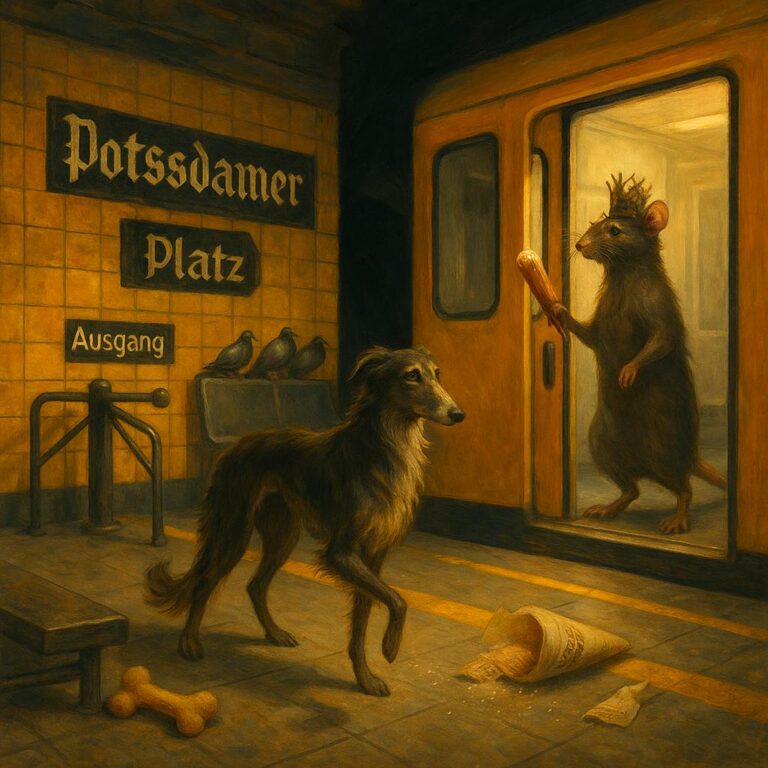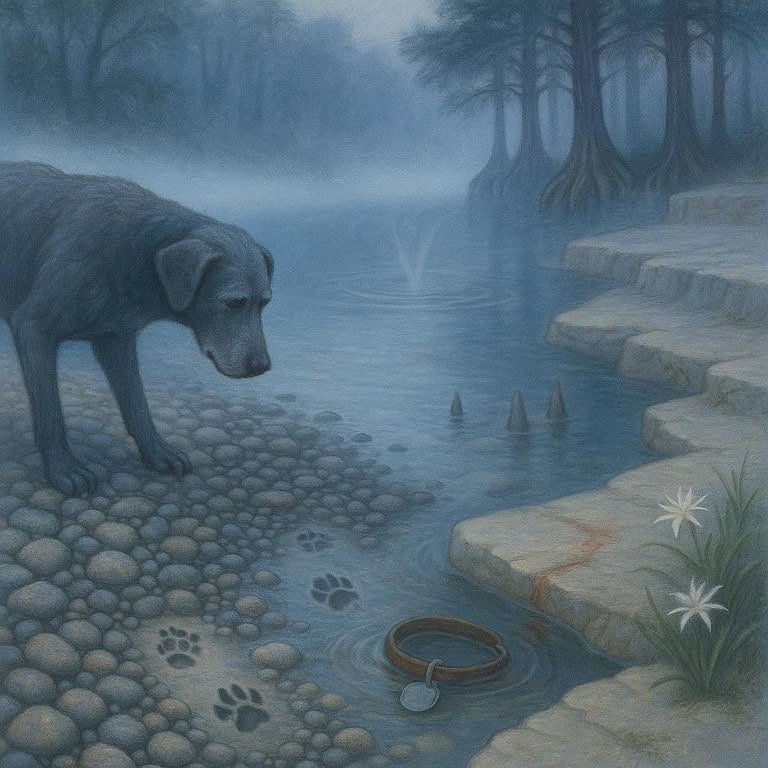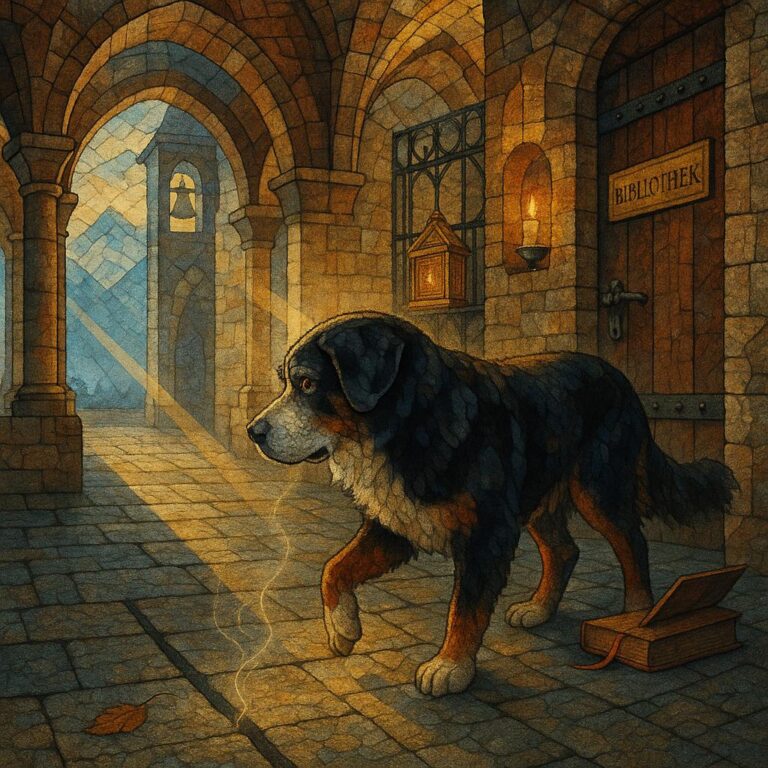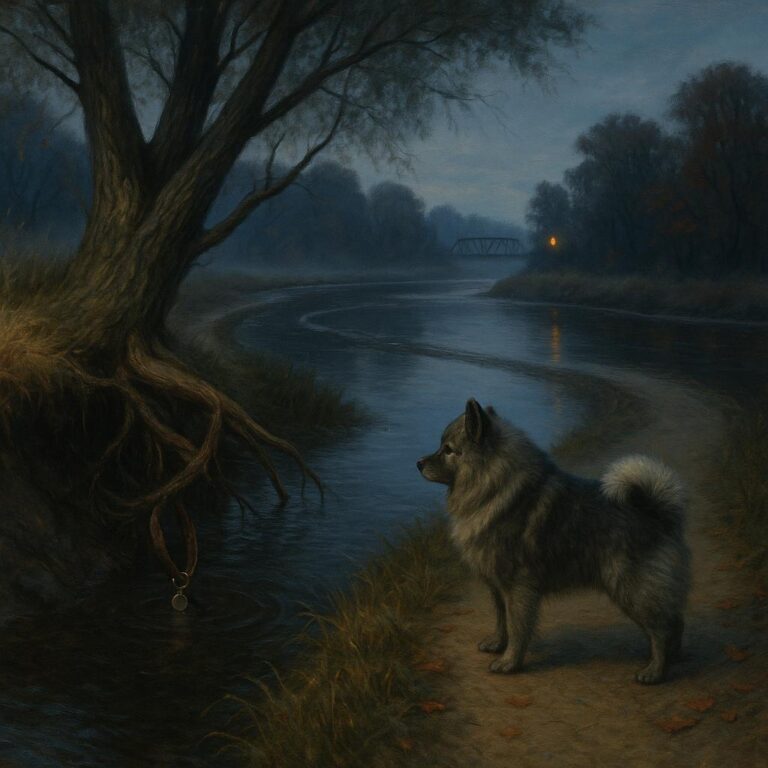Where Stones Remember

In the courtyard of the crumbling keep, Hector, a fourteen year old Golden Retriever, felt the stones hold memories heavier than his bones. He paced the rain dark flags, nose low, reading the castle the way a monk reads a psalter. The wind tasted of nettles, wet rust, and something he had loved once. He followed it into a passage where the air narrowed and the world thinned to heartbeats and dust. Time had worn his joints but sharpened his listening. From beyond the oak door came a human breath he knew. The latch trembled. Then it began to lift.
The door breathed out damp oak and cold iron. Light cut a thin blade into the passage and with it rode the breath that had once told him when to wake and when to wait. Hector’s tail lifted of its own old will, slow as a bell rope.
“Hec?”
Not a word so much as a remembered shape of sound. The man was taller than the boy Hector had followed through barley and thistle, older around the eyes, but the breath was there: apples gone soft in a pocket, rain dried off wool, the particular salt at the hollow of the throat. He smelled of trains and paper and the river, and underneath, stubborn as a knot in wood, the house they had been.
Hector pressed his head into the man’s knees and the man folded to the floorboards as if they had agreed to it long ago. Fingers found the worn fur between Hector’s eyes, rubbed the place that made him blink with gratitude. “Good lad,” he said into Hector’s ear, and what mattered was not the words but the old music in them. Something in Hector that had been suspended, like dust in a shaft of light, gently settled.
A beam somewhere above them groaned with water weight. Hector felt it first in his paws—the tremor nobody else hears. The smell of wet rot sharpened. He pushed his body against the man’s shin, insistent, then turned and limped, looking back, then forward, the old lesson. Come.
The man hesitated, listening to the castle’s ache. Then he nodded as if Hector had spoken, and followed. Hector took the path he had always taken when storms came in from the moor: the left-hand sweep that avoided the cracked tile, the step that always gave, the low arch where his spine knew exactly how to bend. Behind them the oak door sagged back on its hinges with a tired sigh. Plaster burst somewhere and chased them in a powdery cough.
In the courtyard the rain had thinned to strands. The keep stood like a wet animal shaking itself, slate shivering, gutters hissing. The man’s breath went ragged and hot. He crouched again and buried his face in Hector’s ruff, laughter and grief in the same sound. “Look at you,” he said, as if Hector were a found map.
Hector leaned into him until his hips trembled. The cold had settled deep into the hinge of him these past winters, but now a warm, old feeling moved through the ache, something like lying under a table while feet came and went and the world was safe and full of crumbs. He could taste the boy’s childhood on the man’s skin as if time had left cinders he could nose.
The keep let out one long, tired breath—some inner wall yielding at last—and then was quiet. Rain tapped gentler. The nettles along the broken steps tilted, rinsed clean.
Hector could feel his listening spreading outward, thin as silk, catching everything: the drip from the gargoyle’s jaw, the slow turn of the man’s heart under wool, the rook complaining from the lime tree, the small good noises of a place that had known them both. He circled once, the old ritual of making a bed where there is none, and folded himself down on the flagstones still warm from the day that had been before the rain.
The man’s hands were on him, careful as if he were glass. “I should have come sooner,” he said, a useless, human thing that still laid itself gently over the moment. Hector breathed him in for the simple comfort of it. The wordless joy of now. He let his head settle into the cradle made by the man’s palm, the way he had as a pup when the world was enormous and kind.
The scent that had called him here, the something he had loved once and forever, was no longer a trail to follow but a circle completed. He did not have to listen hard anymore. He blinked at the grey slice of sky between the towers until it blurred, and when he shut his eyes the dark was easy, like lying under a bench while rain wrote its quiet on the stones and someone hummed in the next room.
“Good lad,” the man said again, and the holy cadence of it was the last thing Hector carried with him as the keep, relieved of one more secret, held him and let him go.






